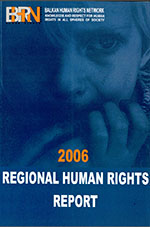Human Rights in the Republic of Croatia in 2006
Human Rights in the Republic of Croatia in 2006
Author(s): Marta Vidaković MukićSubject(s): Law, Constitution, Jurisprudence
Published by: Balkan Human Rights Network
Keywords: Human rights; legal protection of individual human rights; acces to education; acces to work; discrimination; national minorities; pensioners
Summary/Abstract: This article explores the situation with human rights in Croatia in general in 2006. and the progress in respecting of human rights regarding a year before. It is clear that the stagnation is noticeable regarding a year of 2005. The consequences of violation of human rights from earlier years are not completely reorganized. The housing and other existential problems of returnees (the housing, employment, electricity supply, returning of agricultural land) still haven't been resolved adequately, it hasn't been done enough for integrating of Romany students in school system, social status of so called new pensioners is worsened and slowness of Croatian courts is still major problem. Ethnically motivated violence and ethnic intolerance is not reduced, although public reactions against these manifestations are more frequently then in previous years. The human rights in legal acts in Croatia are well cowered. The Constitution of the Republic of Croatia edits human rights in details, in separate chapter (Protection of human rights and fundamental freedoms), in 55 articles, and it is systematized in two groups: (1) personal and political freedoms and rights and (2) economic, social and cultural rights. All classical human rights and freedoms are included, most of the second-generation rights and right to healthy living. From 08th October 1991 the Republic of Croatia is, by notification of succession, a party of all international treaties which were accepted by ex Yugoslavia (SFRJ). Until the end of 2006 Croatia ratified most of international instruments for protection of human rights. The principles of legally no obligatory international treaties are also implemented in positive legislation. This paper aims to uncover the individual rights: (1) to free and obligatory primary education and equal accessibility to all kinds of secondary and higher education, right on non-discrimination in education on all levels and fields of education, phenomena of voluntary segregation of children concerning their ethnic affiliation, in east Slavonija; (2) on legal protection of individual rights (access to law), access to effective legal protection, a right on effective court protection, legal remedies and the Constitutional lawsuit, national human rights institutions, non-judicial bodies (ombudsman institutions and their role), the problems in realization of right to access to law and court, (3) labour rights and violations of labour rights . In this article is cowered the situation of disadvantaged, marginalized and vulnerable groups: (1) the right to work - minorities and development of equal opportunities for employment, discrimination in employment and other violations of labour rights (berth discrimination, ethnic discrimination) , (2) the social rights of the pensioners who are the most vulnerable and most numerous group, according to criteria of poverty, age and health condition and among them those who have retired after 31st December 1998.
Journal: Regional Human Rights Report
- Issue Year: 2006
- Issue No: 01
- Page Range: 121-156
- Page Count: 36
- Language: English

